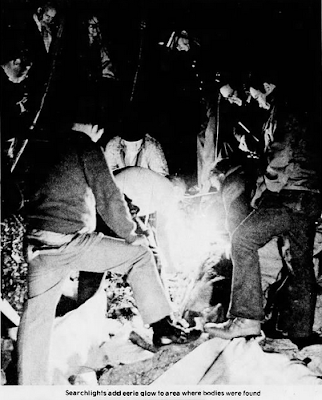The Widger Gang and a Potter County Murder Mystery
 |
| Potter County during the Lumber Era |
In the years leading up to the Civil War, Potter County was a sparsely-populated wilderness where bandits and horse thieves struck fear in the hearts of the early settlers. The central portion of the county was the base of operations for one particularly notorious band of highwaymen known as the Widger Gang, whose exploits are still the topic of much campfire storytelling in Potter County.
The bandits of Potter County first became a nuisance in the 1840s, when horse thieves set up shop in a dark hollow above the Genesee Fork of Pine Creek. Their den could only be reached by foot; the bandits had to lead their horses up the creekbed after leaving the main road at a barn adjoining the Genesee Fork. This barn, of course, was owned by either a member of gang or a man who was sympathetic to their cause. Once the stolen horses reached the secret hollow, one of the men dyed the animals so they would not be recognized. By all accounts it was a highly skillful operation, and the pilfered ponies were sold as far away as Jersey Shore and Williamsport.
We know these details thanks to one intrepid detective from the village of Ulysses named Orange Austin Lewis, who spent years collecting evidence against the bandits. Finally, in 1861, Lewis believed that he had put together enough evidence to nail the horse thieves. He learned that the ringleader of the outfit was a man by the name of William D. Widger. However, before he could present his case to the authorities the war broke out, and most of the outlaws evaded capture by enlisting in the Union Army. Lewis himself enlisted, but was killed in 1862 at Harrison Landing, Virginia.
Widger became an officer in the army, rising to the rank of captain, but his military career was cut short after he was dishonorably discharged. The Report of the Adjutant General of Pennsylvania shows that this occurred on September 16, 1861. Upon his return to Potter County he formed a new gang with the Howard brothers. While Captain Widger excelled at stealing horses, the Howards excelled at stealing everything else, and together they set about stealing everything that couldn't be bolted down. The newly formed Widger gang stole everything from beehives to laundry left hanging on the clothesline. But their real talent was for stealing cattle.
When it came to cattle, Widger and the Howard brothers devised ingenious ways to conceal their actions. Rather than trying to pass off the stolen animals whole, they slaughtered the cattle and salted the beef, storing the meat in cans and barrels and burying them so they could be sold at a later date. Even the wives got in on the racket. One local lawman, Ephraim Bishop, discovered a slab of mutton that had been stolen by moving a chair that Widger's wife was sitting in, in spite of her protestations. The missing mutton fell out from beneath her skirt. Near Widger's home Bishop also found goods that had been stolen from William McDougall's dry good store in Oswego, along with Judge Mann's grindstone. This led to the capture and arrest of the Widger gang in December of 1862. One of the bandits turned state's evidence and testified against the others, and the entire bunch was shackled and shipped off to the penitentiary.
The Murder of Chaplain Patterson
Because of their notoriety, virtually every crime in the region was attributed to the Widger gang. When a bundle of counterfeit currency was found by workmen behind a wall in D.F. Glassmire's store in Coudersport in 1868, suspicion fell upon Widger and the Howard brothers (even though the evidence strongly pointed to a local counterfeiter named John Crittenden). Today, it is almost impossible to distinguish fact from fiction when it comes to the crimes the Widger gang was said to have masterminded. At the time, there was only one newspaper in the entire county-- the Potter Pennant-- and the paper wasn't published on a daily basis. Records were scarce back then, and the few documents that once existed have been lost or destroyed. All that remains are legends, and the most enduring legend concerning the Widger gang involved the mysterious murder of an army chaplain by the name of D.B. Patterson. Records indicate that Patterson was attached to Ullman's Brigade-- the famed brigade comprised of colored infantry.
The murder of Patterson took place in 1863, after Orange Lewis had been killed in battle and Widger dishonorably discharged. According to local tradition, Chaplain Patterson returned to Potter County with somewhere between $1,500 and $2,000. This money was the salary the soldiers had been paid, and it was Patterson's job to deliver it to their families. The chaplain was last seen departing Moore's Hotel in Olean with a stranger believed to be one of of the gang members. Legend states that Patterson was robbed and killed and buried somewhere near the Five Corners in Hebron Township.
Not long after Patterson's disappearance Sarah Cole, the daughter of a county judge, was digging spiceberry root (a popular medicinal herb of the era) in the woods when her spade sunk into the earth and she smelled a revolting stench of decay. She was so frightened that she ran from the spot and never returned, though she believed she had uncovered the grave of the lost chaplain. At any rate, the body of Chaplain Patterson still hasn't been found to this day.


They look like they are hungry. I wish they had not cut that forest down.
ReplyDelete